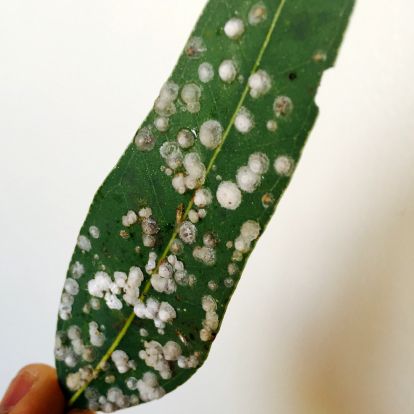Arbor-wellness: Psyllids
When large trees lose their leaves in mid-summer, we tend to panic, and often for good reason. We tend to think of water problems or diseases as the main cause, but sometimes it may be a small insect that is hard to spot. Psyllids are small insects that suck plant juices and excrete sticky honeydew on which blackish sooty mold grows. Some species secrete pale or white wax masses, pellets, strands, or coverings called lerps. They affect many species of trees in our region, but the most common are Eucalyptus, peppertree, citrus, acacia, laurel and tipu or rosewood.
My eucalyptus trees are losing lots of leaves, what could be wrong?
There are several reasons why eucalyptus leaves drop their leaves in large amounts. If you see small, whitish “caps” on the leaves, this is a type of “psyllid” called “redgum lerp psyllid”. This is one many psyllid types that are common in our region.
What other damage can psyllids cause?
High psyllid populations reduce plant growth and cause tip damage, discoloration or dieback. Certain species can cause premature leaf drop. Excessive honeydew creates a sticky mess on cars and surfaces below trees.
Do psyllids damage other trees in my landscape?
There are over 160 psyllid species that occurs on landscape plants in California. Each kind of psyllid feeds only on one plant species or one closely related group of plants. Most psyllids native to California are relatively uncommon and rarely become pests. But some can cause extensive damage. These are generally psyllids that have become pests on trees that are originally from other countries. The most important tree damaging psyllids occur on acacia, eucalyptus, olive, peppertree, laurel and citrus.
I’ve heard about citrus trees dying or being taken out, is this the problem with them?
Well, sort of. A relatively new psyllid pest (Asian citrus psyllid) has been introduced into parts of California. The insect itself doesn’t kill citrus trees, but it can introduce a disease called “Citrus Greening” that is essentially fatal to them. If allowed to become widespread, it is feared the California citrus industry will be wiped out. Currently, the agencies involved are heavily involved in scouting, insect control and plant removal efforts in regions that are most affected. Being vigilant about scouting and controlling this pest when found is very critical.
What can I do?
Your Arborwell arborist can identify locations where Asian citrus psyllid, Redgum lerp psyllid (or other types) are doing the most damage and recommend a treatment program to recover your trees and to keep them healthy. They can also recommend a proper plan for citrus trees on your property if you are close to an area affected by Asian citrus psyllid.
Fill out the form below to contact an Arborwell arborist and find out more about Psyllids and what we recommend for preventing damage and for helping trees recover if they have been attacked by high populations of Psyllids.
arborist, eucalyptus, insect, preventative tree care, psyllids, tree care
